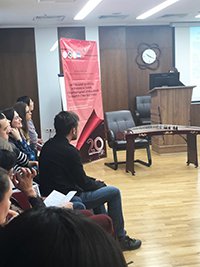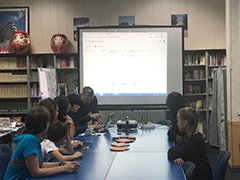20 Years of Dispatching Japanese-Language Specialists to Siberia, and Beyond
Novosibirsk State University
MITSUMORI Yu
Japanese-Language Specialists (hereinafter “Specialists”) from Japan have been dispatched here for 20 years, but the time has finally come to hand the baton over to the local people. I don’t have much time left in this post; here I will introduce Japanese-language education in Novosibirsk State University, as well as in the city of Novosibirsk and nearby locations (saying this, these are far away enough that it takes a literal overnight journey by train to get to any of them).
Japanese-Language Education in Novosibirsk State University
Novosibirsk State University, where I have been dispatched, is located in a research town on the outskirts of Novosibirsk City, an hour away by car. Around 50 students are studying Japanese as their first foreign language in the Oriental Studies Section, with which I am affiliated. Specialists from the Japan Foundation study weekly with all the students who are taking Japanese as their first foreign language. The people of Russia tend not to clearly display their emotions to other people, and the students are generally quiet, so I’m very happy when they smile in class.
Excluding me, there are six teachers in the Section who speak the Japanese language, including the Head of the Section (four people for Japanese-language subjects and two for subjects related to Japan). However, I am the only Japanese person teaching. I run my lessons with appropriate consultation with the Russian teachers about each class. I meet the teachers in the Section office at odd intervals, and on those occasions, we don’t just talk about the classes—they also ask me questions about the Japanese language and research.
In addition to running regular classes, Specialists collaborate with and participate in events such as international academic conferences held at this university, student academic conferences, and events to introduce foreign cultures. Novosibirsk State University has accepted Specialists in the Japanese language for 20 years; there are still very few opportunities to meet Japanese people here, but teachers in the Section have established their own style of teaching, and are able to produce graduates of a certain level each year.
Novosibirsk, Western Siberia, and Japanese-Language Education
In addition to the work at Novosibirsk State University described above, Specialists also support other Japanese-language educational institutions in Novosibirsk, as well as institutions in Western Siberia. Within the city of Novosibirsk, Japanese language is studied in Novosibirsk State Technical University and its lyceum (note: a lyceum is a type of primary/secondary educational institution), Novosibirsk State Pedagogical University, Novosibirsk State University of Economics and Management, the Center for Tourism and Sister City Relations “Siberia-Hokkaido” run by Novosibirsk City, and Novosibirsk City’s No. 4. Gymnasium (note: a gymnasium is also a type of primary/secondary educational institution) and No. 130 Lyceum. Additionally, the Japanese-Language Proficiency Test (hereinafter the “JLPT”) was also held here in December. I cooperate with the teachers of these institutions and support the implementation of projects relating to Japanese-language education, such as the JLPT.
Until now, I have helped out with a variety of events, including all kinds of Japanese cultural projects run by the Center for Tourism and Sister City Relations “Siberia-Hokkaido”; Japanese speech contests and teachers’ seminars in Western Siberia; academic conferences, Japanese speech contests, and oriental cultural events in the Technical University; and special classes in different universities and schools. As Novosibirsk State University, where I have been dispatched, is located in the outskirts, separated from the city center, it is impossible for me to meet with people from inner city educational institutions that often, but Japanese-language education is actively offered in different institutions within the city, and I meet with teachers and exchange opinions when there is an event held at those institutions.
Novosibirsk City is a sister city of Sapporo, and visitors from Japan often come here. Japan and Novosibirsk may still be physically and psychologically “far” from each other, but now, when direct flights between Novosibirsk and Narita have started operating once a week, I anticipate more exchanges with Japan.
In addition to the city of Novosibirsk, I have also visited the cities of Tomsk, Omsk, and Krasnoyarsk, and collaborated with Japanese speech contests and offered consultations about classes and Japanese-language education in their respective institutions. I attended a Japanese speech contest within an educational institution in Tomsk, and listened with great interest to speeches with presentation formats that made use of PowerPoints and a wide range of themes, like ghost stories. In Omsk, I was able to exchange opinions on classes with the few Japanese-language teachers in the city, and in Krasnoyarsk I visited the Japan Center and participated in the Origami (paper craft) club. I was glad to find that all of the people in these places are studying the Japanese language and Japan through whatever they find interesting, in a context in which there are very few chances to meet a Japanese person. I also gained courage from seeing the Russian and Japanese teachers involved in Japanese-language education doing their best in the different areas.

International academic conference hosted by the Oriental Studies Section
2020, and After This...
Now, since the end of 2019, the world and humanity have been facing a huge trial. The region of Siberia, including Novosibirsk, was swallowed up by this great wave of calamity in a flash. A meeting of the heads of each of the universities of Novosibirsk City took place in the second week of March 2020; at the start of the third week of March, the decision was made to move to remote classes in a meeting in the Institute for the Humanities (faculty level), which includes the Oriental Studies Section to which I have been dispatched. This state of affairs meant that we had to move to remote classes immediately, starting the day after the decision, but I had already frequently been using the Zoom video conference system before this, and was able to shift to remote classes relatively smoothly.
When we made the move to remote classes, I felt that the fact that the students handled the shift so easily was amazing. I just said, “Prepare yourselves because we’ll be using this and that for remote classes from now on,” and they were all immediately able to cope. Being able to respond flexibly to this type of change is likely entirely due to their youth and, above all, their excellence—and I admired them.
As everyone knows, Russia is a very large country. There are many towns scattered around this huge nation. From a Japanese perspective, the cities in the vicinity of Novosibirsk are also dotted around in truly far-away locations. This is a place in which we can't easily physically meet with each other, but as a result, it is desirable to use the Internet skillfully. In fact, we were able to hold an online seminar at the end of March. The personnel in the world of Japanese-language education in Russia are all highly talented. If we can treat the current crisis as a rare opportunity, and really “turn the disaster to our advantage” to accelerate online exchanges, then this situation won't just be “painful”—we have room to take it in a positive way. At the very least, I’d like to think so as I continue my work.
From next year onwards, I pray that because we are in Siberia, and because of the current situation, new forms of exchange will become active.

The Origami club in the Krasnoyarsk Japan Center
- What We Do Top
- Arts and Cultural Exchange [Culture]
- Japanese-Language Education Overseas [Language]
- Japanese-Language Education Overseas [Language] Top
- Learn Japanese-language
- Teach Japanese-language
- Take Japanese-Language Test
- Know about Japanese-language education abroad
- The Japanese-Language Institute, Urawa
- The Japanese-Language Institute, Kansai
- Japanese-Language Programs for Foreign Specified Skilled Worker Candidates
- Japanese Language Education for Japanese Children Resident Overseas and for the Descendants of Migrants
- Archives
- Japanese Studies and Global Partnerships [Dialogue]
- JF digital collection
- Other Programs / Programs to Commemorate Exchange Year
- Awards and Prizes
- Publications
